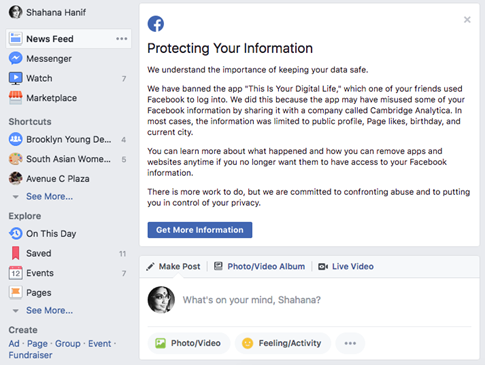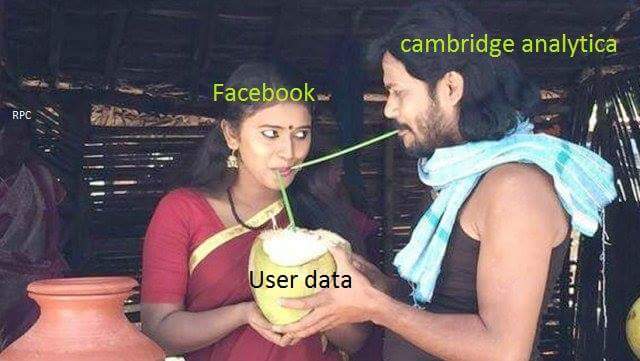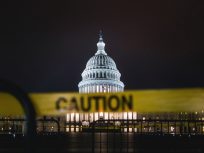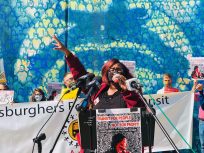
Days after our article on the Internet Freedom Festival was published, Law at the Margins Associate Editor Shahana Hanif was informed that she too is among the 87 million Facebook users impacted by the Cambridge Analytica data breach. In short, and without going into the technical terms of the breach, the data mining facilitated by Cambridge Analytica is Facebook’s faultiest scandal infringing on the privacy of its users. However, companies tracking user profiles through apps and ads isn’t entirely new for Facebook. In the early years of Facebook, many shed light on data tracking and sharing and user profiling, all of which could be misused, regardless of a company’s seemingly nonthreatening rapport.

This is exactly what happened with Cambridge Analytica. Cambridge Analytica specializes in “psychographic” profiling, meaning they use data collected online to create personality profiles for voters. They then take that information and target individuals with specifically tailored content. Such that, during the 2016 Presidential Election campaigns, Cambridge Analytica used real-time information on Facebook to determine which messages were resonating where and then shaped Trump’s travel schedule around it. This helped Trump be one step ahead on issues gaining critical traction in especially small towns, reaching rural voters. The data allowed him to show up to unlikely places and address communities. As we know, this deceptive, but calculated strategy worked in his favor.
What is wrong with data mining what is shared on Facebook? Many argue that informed consent is missing, revealing that our experience on Facebook is consumed with surveillance. As defined during the Internet Freedom Festival: “Internet freedom works along a spectrum and does not necessarily entail revealing particular identities, rather, emphasizes the need for continued discourse and ideas to protect those on the Web. A secure web experience requires consent, just like all other interactions.”
What does this mean for activists, organizers, and movement builders using Facebook and other social medias alike? Following the Cambridge Analytica revelation many users are permanently deleting their account and campaigning with the hashtag #DeleteFacebook to get others on board.
Although New York based activist and community organizer Thahitun Mariam has not deleted her Facebook account yet, she remains skeptical about the role of it for her work with vulnerable immigrants in NYC. “Knowing that our activism can be infiltrated and sold to anyone creates distrust within me and an uncertainty to continue utilizing the website with my personal anecdotes and organizing-related conversations on Messenger, especially about those affected by the Muslim ban or of Bangladeshi families facing deportation.” She’s further curious about the effectiveness of digital organizing and asks whether it is possible to protect and encrypt confidential information in a time of increased deportations and Muslim bans. “Will Facebook stand by their users for protection, or further provide support to the government and private corporations benefiting from the data of organizers and activists in the global community?”

Many like Thahitun are asking these questions, especially as newer information pertaining to Facebook’s weak privacy settings are exposed. For example, the largest Black Lives Matter Facebook page was a scam run by a white man in Australia. Ian Mackay, the admin of the fake page, even raised funds amounting to $100,000. The Black Lives Matter Global Network responded, “It’s extremely important that platforms like Facebook and Twitter do their due diligence with users so that supporters of our movement, and movements like ours, aren’t misled and that resources aren’t misappropriated.”
Digital Rights Activist Talal Raza from Pakistan says, “In Pakistan data breach is a non-issue for a major chunk of the population because it is hard to make users understand what could be the repercussions of these data breaches and what is it like to see your data compromised.” He compares Internet data breach to his experiences among conventional South Asian households wherein “concerns around privacy and private spaces are considered non-issues given many families live in a joint family system. Nobody gets offended if elders walk into your room without knocking. You are not supposed to get offended if somebody uses your car or demands to use your things.” Talal is making a point that perceptions of privacy vary across cultures which then translate to how communities respond to incidents like Cambridge Analytica. He adds, “But, I see that the younger generation, especially those who have lived in nuclear families, tend to value privacy more offline and online as compared to their peers who have grown up in joint family systems.”
Similarly, Digital Rights Activist Drashti Pandya from India explained, “I know how mass surveillance could be dangerous but non-technical people don’t know in India. They know Facebook is stealing their data but then what?” The tangible impacts of surveillance are not immediately known to Facebook users because many simply continue to use it for recreational purposes.
Numerous activists and organizers will continue to use Facebook for its wide-reaching potential. Among them are indigenous activists who firmly acknowledge that the social network has done more for bolstering the modern Indigenous rights agenda than any other platform, especially in Standing Rock, during the Dakota Access Pipeline protests. Facebook’s communication tools like Facebook Live, Messenger, which acts as a medium for text and voice conversations, has given power to communities, especially those with limited or no access to reporter coverage and digital communication, to spread their truths. Doing so in many instances has led to transnational responses and connections for resistance.
Shahana recently attended the annual NYC Organizing 2.0 Conference, which offers training to organizers and activists in online organizing, digital strategy and use of online tools. At the conference, there was strong emphasis on using Facebook to build fundraising efforts, a workshop on how to use Facebook ads to reach for example, the Senate Republican in the wake of teacher strikes in West Virginia, and how to effectively use Facebook Live for the resistance. If you are interested in learning more, read the full notes here.
Although Cambridge Analytica is shutting down, privacy violation tactics and surveillance should continue to be on our radar. Dalit activist Cynthia Stephen says this incident is an important reminder to be vigilant about our individual online profile. Maybe the decision isn’t to abandon Facebook or other social media outlets, but we are responsible to be cautious over personal and political information shared. What are your security practices following the Cambridge Analytica data breach? Write to us in the comments section or email us your thoughts at editors@staging.lawatthemargins.com




